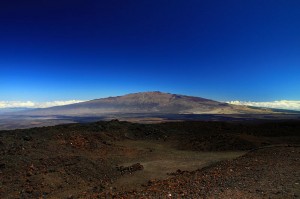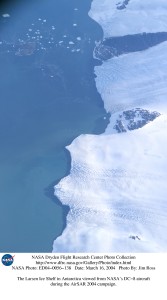As we enter the 400ppm world for the first time in a good chunk of geological history, issues of environment, sustainability and climate change are, more than ever, a source of discussion – and often heated dispute – in the media. As these issues are debated by governments and policy-makers, hardly one day goes by without a series of news articles on topics such as shale gas, warming climate, deforestation or renewable energy, to cite but a few.

View from the Mauna Loa observatory in Hawaii, where atmospheric CO2 concentrations exceeding 400 parts per million were recorded in May 2013. Photograph by Nula666.
According to the recent 2012 World Bank report, some of the consequences of a world 4°C warmer would include extreme summer heat waves, sea level rise which would impact vulnerable coastal states such as Madagascar or Bangladesh, stressed agricultural and water resources and displaced populations. The international community has vouched to limit future warming to 2°C but uncertainties are still large: uncertainties in climate model predictions and in ecosystem response, though the consensus is pretty clear among environmental and climate scientists that humans are driving much of the observed changes, but also uncertainties in what actions leaders will take to meet this aim.
A number of recent environmental policy issues are being debated in governments around the world and have had much coverage in the media: The Keystone XL project has seen a flurry of recent discussion and has been tagged a defining decision in Barack Obama’s environmental legacy. The plan to rescue the European Union’s carbon trading scheme was rejected by the EU commission in April 2013 but might yet be open for another vote. Carbon Capture and Storage, or CCS, is considered an important technology to put in place if carbon emissions are to be slowed down while maintaining fossil fuels as energy sources. Yet, action is slow in Europe and the UK.
While all of these discussions and debates are taking place, scientists around the world continue to carry out their

The Larsen ice shelf in Antarctica, viewed from NASA’s DC-8 aircraft. Photograph by Jim Ross for NASA.
research and to publish their findings in the scientific literature. Sometimes, such as with climate model research and estimates, publications are quickly picked up by the media and policy-makers and incorporated into the wider discussion. In other cases, it seems that policy-making and scientific research follow parallel routes without much interaction. So where do these issues fit in with the current geo-scientific research?
Four degrees aims to explore topical issues in environmental geoscience and climate change research and consider current themes in environmental policy from an inter-disciplinary perspective. The blog will discuss ideas and concepts from the fields of climate change, policy, environmental geochemistry and sustainability, mixing discussions on the latest developments in scientific research, the scientific concepts behind environmental geoscience and how geoscience problems relate to big environmental issues and feed into politics, policy and governance.
So welcome to Four Degrees. Four degrees of geoscience, four degrees of warming and hopefully a thousand degrees of discussion. We hope you will enjoy it and look forward to your comments!
Flo and Marion
